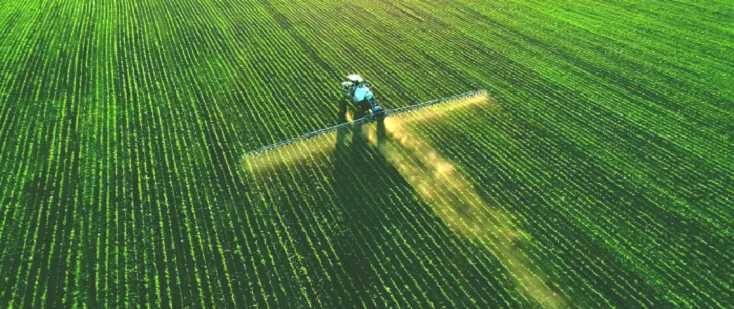 Contact us
Contact usIntent
Community
Studio Organo Concepts
About Us
Subsidaries
Studio Organo
TS RERA No.P02400003403.
TS RERA No.P02400003403.

According to the data published by the government of India in February 2020, pesticide consumption in our country was more than 40000 metric tonnes. Telangana ranked fourth in the nation-wide list with over 4,900 metric tonnes of chemical pesticide consumption in that year.
Are you shocked yet? Our land, which once used to be fertile and rich in nutrients, now suffers a reduction in its quality due to large quantities of chemical pesticides. That’s how the need for organic pesticides to lessen the artificial chemical content of the soil, emerged.
But wait, are we sure that pesticides have only adverse effects? Why would our farmers use them if that was the case?
We are sure it's not. Let's go over both - the pros and cons of using pesticides on farmlands.
Pros of using chemical pesticides
Let's start with what are chemical pesticides? These are synthetic components used in a spray form to keep the pests and insects from eating away the farm produce.
However, usage of these pesticides is only allowed up to an amount that is permitted by the law.
Here, we will see what the benefits of pesticides are, from the perspective of the farmers.
Enhancement in the quantity of food production
The crops which are cultivated for humans attract bugs and other pests. It can lead to food loss and may even reduce the yields to a level that is not sufficient to feed our entire nation.
India has more than 1.4 billion mouths to feed which is why we cannot allow pests to destroy our crops.
Artificially produced pesticides are potent, and they help keep the pests away. It is why our farmers prefer them over organic pesticides as it leads to an increase in the total crops cultivated and hence lead to increased income for the farmers.
Curtailing farmers’ losses
Farming is not everyone's cup of tea. It requires a considerable investment of both time and money. There are various things to learn.
Farmers have to be extra careful when they make these decisions because if something goes wrong, they won't have enough food for themselves, let alone other people.
Fertilisers and pesticides are used because they help mitigate the loss incurred by farmers. Pests are known to contaminate crops. Not only do they spoil the food, but their body may also have harmful bacteria or organisms. They even lay their droppings in the produce, and contaminate it.
All in all, pesticides help prevent loss due to these insects.

Preventing health problems and diseases
According to a study, pesticides have prevented the deaths of seven million people since 1945 by killing these bugs and pests that transmit diseases.
Diseases like bubonic plague, which spreads due to rat fleas, and malaria, which is transmitted from infected mosquitoes, have significantly reduced, all thanks to pesticides.
It is due to these benefits that humans started using fertilisers in large quantities. But soon, they realised that it was a blunder. Keep reading, we will tell you why.
Cons of using artificial pesticides
Now that we've gone through the benefits of pesticides, let's know further about their dangers to humans and our whole ecosystem.
Interestingly, to avoid these effects, the Ministry of Agriculture is giving incentives to organic farmers, which is essentially the natural way of life.
Contamination of local water bodies
This one is pretty obvious and well-known. Due to runoff from agricultural farms, these pesticides often find their way into local water bodies.
Local ponds or lakes get contaminated by them, poisoning and killing the aquatic life. As per surveys, pesticides and insecticides are the leading reason why we lose so much of our fish every year.
Groundwater leaching
As if contamination of the local water bodies isn't enough, leaching of groundwater is another phenomenon seen due to pesticides.
Farmers may spray the pesticides on land, specifically on their crops, but it still seeps through the soil and enters the groundwater streams.
Groundwater is extracted through borewells and is used for consumption as well as for washing our bodies, our utensils, and, clothes. Because of the leaching, the repercussions can be huge.
Pesticides and Human Health
Did you know that the pesticides from all the food you eat are stored in your colon your entire life? Shocking, isn't it? They slowly poison the human body.
Pesticides are associated with several types of cancers, Alzheimer's disease, and even complications during pregnancies. They can severely affect our nervous system and cause mental health disorders like ADHD.
To protect ourselves from all these effects, it is imperative to consume safe food grown using natural farming methods.
Volatilisation of synthetic pesticides
Volatilisation, better known as evaporation of the pesticide spray into the air, can lead to its spread over a widespread area.
If not watched, not only will it pollute the air and reduce the air quality, but it will also be directly ingested by humans as well as the wildlife.
For example, a pesticide known as Atrazine can affect the reproductive health of frogs and even cause their deaths, disturbing the food chain.
Conclusion
The data and statistics are terrifying. It is a grave concern. So what can we do? We, as sensible citizens, can start promoting natural farming, and less use of pesticides and other harmful chemicals on our farmlands.
We, at Organo, are striving hard to make this change. We are developing Organo eco-habitats that are based on a rural-urban way of living.
Connect with us to learn more about "Rurban Life", “eco-habitats” and how they are helping the residents of our eco-habitats have access to safe and witnessed food in our eco-habitat Communities.
